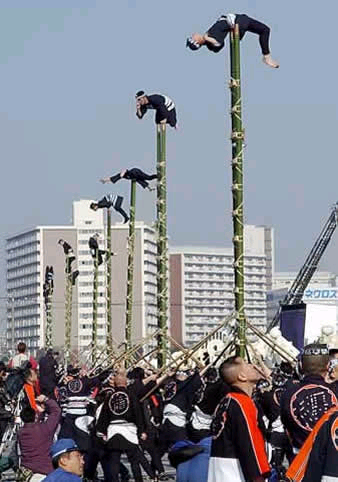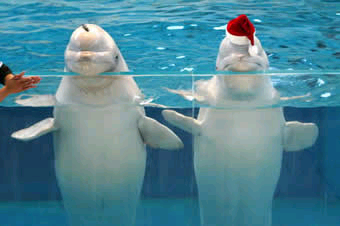

I knew that a fellow - named Konishiki - was a Hawaiian-born sumo champion in Japan. What I didn't realize is that his taste in women is admirably, er, down-to-earth.
Kimono flappers, flaming grass and the ultimate polar bear swimming in today's wide-eyed stare at the Pacific culture we're all better for at least trying to comprehend.
On another note, this Orient bulletin board seems to have an archive of Mainichi Shimbun's Photojournal, if irregularly. You'll notice that the daily Photojournals to which I link (not the Photo Specials) are no longer accessible, replaced by the latest set of press snapshots. I've yet to find an official archive for daily Photojournals (not Specials) - there may be none. So this might be a nice resource if you spy a picture in my category archive and want to see some of the other photos I reference.
Have you ever given any thought to making foreign friends - if you have any and if not, how to go about it? As an American, probably not; but then, you might if your country were historically isolationist, eschewing contact for two hundred years with all Western nations but the Netherlands. Judging from the responses in Japan Today's man-on-the-street canvassing, the question asked isn't an outlandish one.
Slow news day? Tell me about it. A promising Afghan constitution has survived debate; terrorists in Iraq are losing men, arms and confidence by the hour; much of the world has settled back down into day-to-day business (which is welcome, unremarkable as it may be); Spirit has yet to start roving to discover or photograph anything surprising, shocking or stunning; even the Corner is throwing cards into hats, debating on the meaning, origin and social significance of the term "neoconservative."
Ah, but the humdrum stops short of distant shores, as Japanese firemen perform 300-year-old, acrobatic stunts for the benefit of an eager, taxpaying public:

The December 2003 issue of National Geographic ran a story on Japan that included a photograph of firemen: even their uniform designs - shaped like samurai armor - are throwbacks to history. Impeccable service notwithstanding, American fire departments could learn a thing or two about color. Truant sumo, bullet trains on closed circuits, calligraphy bees and more are in this week's head-tilt-and-sigh for the nation ranking third in economic power and first in quirky style.
If people don't stop pestering the Osaka police department, they'll, er, call the police:
The number of prank calls to police in Osaka has drastically increased this year, averaging about 490 a day, officers say."We have no choice but to ask the public to use the emergency hotline to police properly," said an officer from Osaka Prefectural Police. "We may even arrest persistent prank callers."
Officer, let me introduce you to the concept of "filing a false report." You won't regret it.

This cheery merchant is briskly selling his battledores - rackets used for the New Year game Hanetsuki - at the Hagoita Ichi fair, but for those of us somewhat distant from Japan's shores, battledores can be purchased online by import dealers. As one kindly explains:
This kind of decorative battledore is used for home or shop decor. Man's face is used as bringer of good luck for business, and a lady's face as a festive decoration. A big battledore fair is held in [the] Asakusa [district of] Tokyo before the New Year. These battledores are [made] to look 3-dimensional on the Paulownia wood base by using polystyrene foam covered by real kimono fabric.
If you're close to both a Japanese enthusiast and sixty dollars*, the battledore looks like the perfect gift for sport and show.
Battledores galore, citron bathing in the wintertime, skiing champs, Sony robots shamelessly authorizing unseen field goals and more in this week's knowing, ear-to-ear grin at one of the most exciting Pacific cultures around.
(*Or cheaper somewhere else, and I've no idea as to the vendors' credentials.)

Believe it or not, drawing children into the world of grooming through cartoons and toys is old hat in America. Twice or three times, my sister and I were taken to an establishment called Fantastic Sam's that operated on the same principle as this Japanese example: keep the juniors occupied with animated shorts, ensure that they go happily out the door with a free toy. The gimmick worked its charm, though it wasn't worth a terrible trim my sister eventually received from a flamboyant stylist named "Skipper." No plaything is worth a bad bob. So my folks returned us to the traditional, austere world of barbers (though the fellow we used at the time, Dave, played some wiseacre games with his photo-identified, wall-mounted credentials).
But of course, she wasn't surrounded by Hello Kitty - which brings us back to the H.C. Studio in Yokohama. Broaden your knowledge of modern hairstyling, snow monkeys, pickles, Koizumis protesting Koizumi, and more in this week's approving glance at the North Pacific's third-level mini-boss.

With the celebration of Thanksgiving comes the old Macy's Thanksgiving Day Parade, where jolly old Saint Nick rolls into Herald Square before signing papers to authorize the official Beginning of the Christmas Season (and least that's what I've been told). Central planning from North Pole corporate suits aside, some parts of the globe are just as enthusiastic to celebrate their own interpretation of the season. Japan is no exception. See Tokyo's one-time, radioactive reptilian archenemy in lights and a pixie-like spirit in white-trimmed, red woolen whose, er, distinguishing characteristics suggest a misreading of the world "Santa" somewhere along the line; all in this special holiday hat-tip to modern democratization's most eccentric client.

Expect a Japan political news roundup tonight or tomorrow (I don't expect enough time tonight, so count on tomorrow). Until then, read all about a sumo superstar in the Mainichi Shimbun's own Pacific 411.
OH, OKAY: I'll have it together at some point this weekend.

The adage goes like this: leave out the eggs because you'd like to try it differently, and you bake a poor cake. The same goes for modifying election laws from the more successful standards set in America and Britain. Yesterday we gave Japanese politics a quick glance in anticipation of Sunday's general election. As it is, foreigners may be looking forward to the event more than native voters - and only then marvelling at Japanese disinterest:
Japanese politics and elections lack the kind of spectacle, political enthusiasm and festivities that one witnesses, for example, in the United States during presidential elections or in countries such as India, where almost everyone becomes immersed in politicking at general elections. In Japan, fewer people turn out on an election day as trust in politics and politicians remains low.
William Chapman, former Tokyo bureau chief of the Washington Post, describes traditional Japanese campaigning:
In most democracies, political campaigns are thought of as vehicles that draw citizens into politics. In Japan the campaign is yet another example of how the system has come to insulate people from politics. The word campaign is here used advisedly, because it bears little resemblance to those in other modern democracies. It consists in large part of scenes like this: A car mounted with loudspeakers moves slowly through a neighborhood street. A smiling man, the candidate, waves at passing pedestrians, his white-gloved hand extending through an open window (the white glove being a symbol of purity). From the loudspeakers comes the shrill voice of a woman (a campaign aide) shrieking, over and over, the candidate's name and the greeting, "Doozo Yoroshiku." And that is the biggest part of the political campaign in Japan.
Chapman goes on to list the myriad regulations that effectively prevent a politician from spending any appreciable time with the electorate; presenting his platform, discussing issues, connecting with the population. As of 1991, when Chapman's book Inventing Japan was published, even door-to-door walks were illegal. Under such restrictions, the grassroots potential is nigh well impossible. Where Japanese authorities sought to limit corruption and stamp out extremism - laws set by the Occupation were far, far more lenient and reflective of America - they have created a lifeless cycle of popular election.
Most frustratingly of all, it seems that, absent a sweeping public outcry, only the most brazen populist could hope to challenge election laws. As with any campaign law restricting free speech, incumbents benefit enormously; and incumbents are the men and women writing the laws. Liberal Democratic Party members would have little motivation to destroy the systems that support entire political careers.
Need Japan's domestic woes become severe before the country reassesses its deep electoral flaws? Even if that's the case, a minor calamity would be worth better, more competitive elections whose winners could bring about some palpable reform. Observers, however, believe that an opposition-party victory by the Democratic Party of Japan could throw just the right amount of cold water on the Diet - so Mr. Mitsunori Okamoto above had better get peddling.

Last spring I attended my first American auto show in years, and was wowed by a sleek concept car from Lincoln; its body was straight out of Blade Runner, the interior's upholstery heavily borrowed from 2001: A Space Odyssey. But it was the only engineer's side project to see there. Naturally, the Tokyo Motor Show 2003 is stuffed with cars of one man's tomorrow - from the gorgeous to the utilitarian to the bizarre, to the polished metal sunflower seed with wheels. All that and more in this week's peek at the Pacific's own Best of Show.
BONUS: We all knew that Flash animation would eventually arrive at staggering artistic heights. And that the triumph would be all Japan's. (Thanks, Patrick.)
COINCIDENCE?: Unbeknownst to me, Lileks made a random reference to H.G. Wells today, too. I'm guessing the seed was planted a few days ago when Glenn Reynolds linked to a blogger comparing the present conflict to The War of the Worlds.
